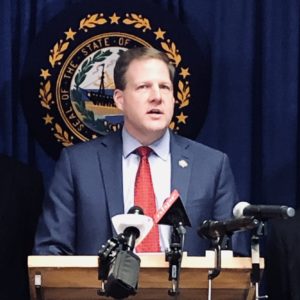On Thursday, New Hampshire legislators will vote on a state budget that contains many victories for conservatives on both cultural and civil liberties issues. Those victories include some modest, but real, emergency powers reforms.
If passed, the budget will forgive and refund COVID-19 fines, as well as giving legislators the power to override specific emergency orders. It will also require the Governor—90 days after declaring any emergency—to call a joint session at which legislators must vote on whether to end the state of emergency.
But the budget does not contain a provision that many reform advocates wanted: a requirement that the legislature affirmatively re-authorize the state of emergency. In response, some legislators are considering voting the entire budget down.
New Hampshire conservatives should understand the choice that Republican legislators are facing. Getting a better budget is no longer an option. There are now two options: the current budget—which has many substantial victories for conservatives—or a Democratic-led budget that has none.
Voters must call on their representatives to pass the current budget and then work together to advocate for further emergency powers reforms. They should also warn Republicans not to open the door to Democratic control simply to make a symbolic point.
Emergency powers reform is critically important. But drawing lines in the sand over the budget did not solve the problem—and it won’t magically work a second time.
As someone who has been involved with efforts to limit emergency powers since the pandemic began, I empathize with many of the representatives who have been demanding greater reforms. In my legal practice, I have represented churches and a small business in navigating and challenging emergency orders. I have also worked on and promoted bills designed to reform our emergency powers statutes.
While Governor Sununu has been more restrained than blue state governors, on paper, the governor of New Hampshire seems to enjoy one of the most deferential systems of emergency powers in the country. I’ve been as frustrated as anyone else by the fact that many reasonable attempts to limit those powers have been sidelined.
But some reform advocates don’t seem to understand the significance of these failures. The fact is that drawing a line in the sand over legislative re-authorization did not yield all of its intended results. Yet some insist that the same strategy will work a second time after the current budget has been destroyed.
It’s difficult to imagine how anyone could think this will work. Even if the same Republicans did come to the negotiating table and start again, they would be more divided than ever before.
But, in practice, the result will be far worse. If some Republican representatives blow up this budget, Governor Sununu will turn to the Democrats—together with a handful of the state’s most liberal Republicans—to craft a budget that will contain no substantial gains for conservatives at all.
Those few Republicans who destroyed the budget will then wear the albatross of having betrayed conservative victories and ushered in a Democratic budget in a Republican-led state. Their defining accomplishment will not be a policy victory, but a futile act of bitterness and nihilism.
There is strong evidence that Sununu will turn to the Democrats if this budget blows up. When that happens, all of the conservative victories in this budget will be destroyed.
There are at least four good reasons to think that, if the Republican majority fails to pass the budget, Governor Sununu will look to the Democrats. First, whatever I might think of some of his policies, Sununu is not a pushover.
Think back to 2019, when the Executive Council rejected Gordon MacDonald’s nomination to the Supreme Court for partisan reasons. Sununu is a moderate who is ordinarily willing to make nominations that partisan Democrats will accept. But once the Council had put a gun to Sununu’s head, he refused to humor them any longer. Instead, he simply walked away and left MacDonald’s seat vacant for a year.
Like those who want to blow up the budget, the Democrats who rejected MacDonald probably believed that Sununu would bear the blame for a long court vacancy. Instead, even Democrats soon realized that they couldn’t blame the situation on Sununu with a straight face.
Secondly, Sununu might think that the spectacle of a Democratic budget would help him attract some Democratic support in a future Senate race. Many Democrats voted for the Governor last year, and Sununu continues to enjoy impressive approval ratings among Democrats. Once a Senate race begins, of course, Democrats will line up along far more partisan lines. But Sununu could conclude that a centrist budget would help him translate his current numbers into a small but significant edge.
That brings me to a third point: that Sununu may expect that he can take Republicans for granted. In the face of an increasingly totalitarian Democratic Party, conservatives can ill-afford to allow Democrats to hold an up-for-grabs Senate seat. As long as Sununu maintains certain baseline conservative credentials, many conservatives will feel that they have no choice but to vote for him. He might calculate that adding a marginal number of Democratic voters to his hand is all he needs.
Finally, Sununu will have an airtight excuse for working with the Democrats. “I would’ve preferred a more conservative budget”—he could plausibly say—“but a few juvenile and extreme legislators gave me no choice. I had to allow the state of New Hampshire to operate.”
Sununu will point out that he had made real compromises in the first budget. The provision to reverse and refund all COVID-19 fines, for example, is clearly distasteful to him. But these good-faith compromises, he will say, were thrown back in his face. If anything, it would have been foolish for him to try negotiating a budget with Republicans again. They would simply have destroyed the new budget when it was inevitably not perfect.
History never respects those who cause damage purely to take their revenge on the world.
Ironically, these arguments will be bolstered as those who sabotaged the budget are increasingly seen as ghouls. Once work on the Democratic budget gets underway, conservative constituencies will realize that a few Republicans have consciously trashed their policy goals to make a symbolic political point. This will include opponents of late-term abortion, opponents of critical race theory, school choice advocates, and small business owners hoping for relief from COVID-19 fines.
Our liberties in New Hampshire are like a city under siege. There is certainly an important debate to be had about how to defend that city. But a few of the city’s defenders are currently deciding whether to throw open the gates of the city and watch it all burn to the ground.
History offers many examples of leaders who, when things were not going their way, did exactly that. None of them are remembered as anything other than miserable failures. If a few legislators do destroy the budget, the most success they can hope for is the fleeting emotional satisfaction of taking their revenge upon the world.
On the other hand, if conservatives work together to secure these victories, then we can work together to push for further emergency powers reforms as well. Contact your Republican representatives and urge them to do the right thing. If they are considering rejecting the budget, it is not too late for them to make the right choice.




